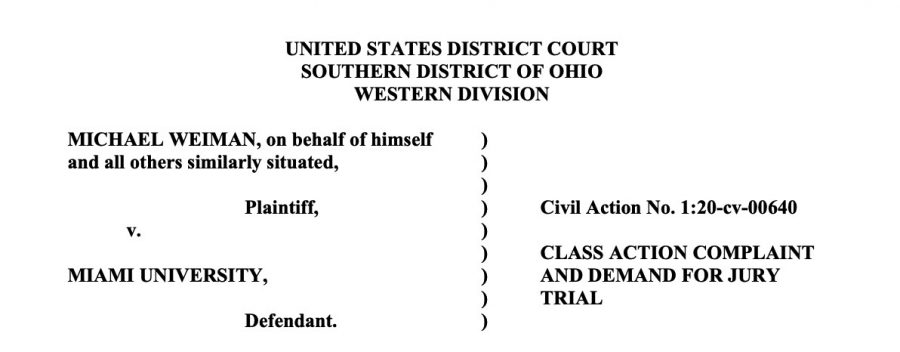Parent sues Miami University over tuition compensation
Cover page of the suit filed against Miami University regarding online learning.
August 28, 2020
Michael Weiman, a Miami parent, believes the university has failed to fairly apportion the financial burden brought upon by the coronavirus pandemic.
Weiman sued the university Aug.18 in the U.S. District Court in Cincinnati, claiming that Miami failed to provide its students — including his daughter, a senior supply chain and operations management major — with the full value of the services for which they paid for and are entitled to recover compensatory damages. Because the same issues would apply to every student at Miami, Weiman asked the court to certify the suit as a class action.
The lawsuit comes as a response to the university’s continuation of online classes. It claims Miami owes refunds to its students in excess of $5 million. Weiman, a divorce attorney from the Chicago area, filed the suit after learning the university would only credit students $750 each for holding only virtual classes the first five weeks of the fall semester.
“Miami University refuses to refund tuition and related expenses, purportedly on its provision of online classes,” the suit said, “In so doing, Defendant is attempting to replace the irreplaceable – on-campus life at an elite university – with ‘virtual learning’ via online classes, and is attempting to pass off this substitute educational experience as the same as, or just as good as full participation in the university’s academic life.”
In response to the COVID-19 pandemic, Miami University gave students until Aug. 21 to decide to either participate in the phased reopening of classes, or complete the Fall 2020 semester online.
Students opting to resume in-person classes the week of Sept. 21 will receive $750 credit. In-state students choosing to take classes online for the remainder of the semester will receive a $1,000 credit, and out-of-state students doing the same will receive a $2,000 credit.
Weiman said he believes the University has shortchanged the students.
“[Miami students] went to college to be in a learning environment where they can work on projects with other students, be in a group setting and engage with people face-to-face in small groups and in daily discussions and interactions,” Weiman said. “[Miami students] are not getting that.”
According to the suit, Weiman paid $18,455.40 for tuition and fees for the spring semester, which ended all in-person classes on March 11. He paid $18,325.00 for the current fall semester.
Not all virtual classes are held in the same way
While the university declined to comment on the suit, saying it does not comment on pending litigation, some members of the Miami community did talk to the Observer about how the virtual college experience is working. It was noted that not all online classes are taught in the same way.

Many classes are held synchronously, meaning the class meets together through Zoom or another online meeting platform at regular times on regular days, just as it would in a face-to-face setting. Lectures, assignments and discussions occur just as they would in a traditional classroom setting.
Other classes are held asynchronously, allowing students to sign-on at their convenience and do assigned work, hear pre-recorded lectures, etc., at their own speed.
Decisions regarding the presentation of an online course are often left to individual professors, with the university and specific departments offering guidelines.
In March, when the university closed the campus, faculty muddled through an abrupt transition from face-to-face teaching to online instruction.
“What we saw during the pandemic, nobody had time to prepare (back in March),” said Jason Abbitt, associate professor of education.
“I think there was a lot to be very proud of in how well Miami made that switch, really quickly,” Abbitt said. “There are undoubtedly challenges along the way, but I think generally speaking, what I saw was a lot of people doing a lot of work to do the best we could do at the time.”
Senior Jannie Kamara, president of associated student government (ASG), said she thinks the university has to consider how online learning works now and into the future.
“The biggest overarching thing is just update your policies and ensure that when you’re updating them, students are in the room to talk about their experiences,” Kamara said.
Curriculum for each online class is required to be tailored for all students’ needs and learning objectives, said Abbitt. All Miami faculty members are encouraged to go to different workshops for online learning requirements throughout the year.
Students registered with the Student Disability Center are required to submit a form online at the SAM portal to communicate directly with professors regarding personal accommodations needed for a better online class experience.
“So, they’ve changed the learning experience for both students and faculty in a pretty dramatic way and any time you have a dramatic shift like that, it’s not going to feel great,” said Abbitt. “I think there were a lot of faculty that did a lot of work to make that experience as positive, and kind of reduce the trauma of that change as much as possible. And I think there are a lot of students who also made that helpful as well,” he said.
Ben Maldonado, a sophomore computer science major, said the problems caused by the switch to online learning do not affect everyone equally, so the university should do more to support students and lower-level faculty.
“I understand the need to cut costs, but the reality is, the (online) education is nowhere near the same quality,” Maldonado said. “I can’t see other students, projects and hands-on learning are nonexistent, technical difficulties cut class time a lot and I am currently in a different time zone, which affects my opportunities,” Maldonado said.
Education with an asterisk
Weiman, the plaintiff in the suit, spoke to the Observer about what he sees as some of the weaknesses of the online classes. “Zoom doesn’t allow a dialogue,” he said. “Zoom doesn’t allow a teacher to observe in the moment if a student and the subject matter are connecting.”
Weiman said he envisions a federal judge using the outcome of this case to lay precedent for other universities to ensure consistent rulings. He also believes the online education being offered may negatively impact students in the long-run, because employers may deem a year of virtual education as incomplete or inferior.
“Don’t you believe that whoever wins the World Series this year will have an asterisk under their name?” Weiman asked. “I’m worried that the class of 2021 is going to have that same asterisk, showing that they didn’t get the completion of their education in the same way everyone else did.”
Miami University has until Sept. 9 to respond to the lawsuit. Attorneys Mitchel Luxenburg and Larry Smith, of Beachwood, Ohio are representing the plaintiff.














